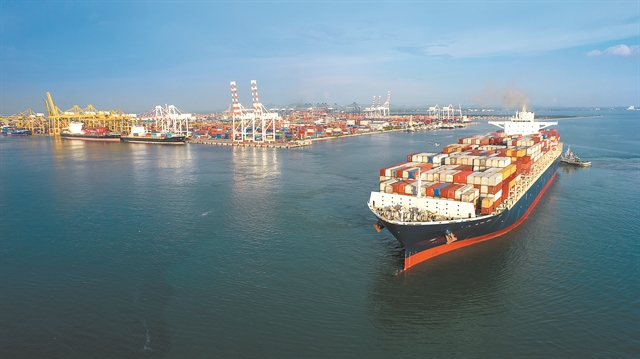Despite all the difficulties the world economy has to face and given the fact that shipping is the real backbone of world trade and supply chains, as 90% of all goods are transported by sea, Greek shipping maintains its role in the industry, currently representing 21% of the global fleet and 59% of the European fleet, while the inflows into the Greek balance of payments from maritime transport are now the highest recorded since 2008 and amount to more than 17 billion euros.
What do Greek shipowners control?
Greek shipowners with 5,514 ships control 32% of tankers, 25% of bulk carriers and 22% of the fleet of liquefied natural gas (LNG) ships worldwide, with the latter category being considered strategically important in the independence of the Russian gas.
At the end of 2021, according to the assessment of VesselsValue, the value of the Greek-owned fleet was around 145.887 billion dollars, ranking 3rd in the world after the Chinese fleet (worth 191,253 billion dollars) and the Japanese fleet (187,674 billion dollars).
New ship constructions
The trends, prospects and risks of the shipping market occupied a recent shipping investment conference of Capital Link in Athens, with the views of industry executives outlining the medium-term landscape of the shipping industry.
“The extended re-investment period starting in 2016, can result in an unexpectedly positive course in the decade we are going through. There will be a recovery in new shipbuilding over the next two years, although steel prices have risen. The problem is that the available “green” solutions for shipping do not seem attractive so far. With the exception of some Japanese shipyards, capacity is limited. Demand for dry bulk carriers is projected to increase by 38% by the fourth quarter of 2023. In the case of tankers, demand is growing, thanks to the increased energy consumption of emerging Asian economies,” said Peter Michael Christensen, Head of Research at Cleaves Securities.
The energy transition
Decerbonization is a huge challenge for shipping, and the European Parliament has recently taken an important step in addressing European shipping concerns, in particular by recognizing the catalytic role of commercial operators in shipping and its decarbonization. It now provides for a binding clause in the contracts between shipowners and commercial operators of their ships, ensuring fair treatment for small and medium-sized private shipping companies, which are the backbone of European shipping.
“Energy transition will be based on the carbon and hydrogen value chains, adopting the holistic approach of life cycle analysis to determine the energy footprint. A significant increase in energy production through renewable sources is required. The wind and solar energy production will be tripled, possibly quadrupled, in order to achieve the decarbonization of shipping” said Georgios Plevrakis, ABS Vice President for Global Sustainability.
ESG goals
Regarding the risks associated with successful environmental, social and governance (ESG) goals in shipping, Anthi Miliou from Lloyd’s Register estimated that funding is greatly affected, as it is believed that businesses with better ESG scores gain easier access to financial instruments and consequently greater efficiency.
“ESG targets concern all companies, they have no other choice, since their access to capital is directly affected. It is already a key criterion and its importance will increase from now on, “said Theodore Jadick, head of DNB Markets. “The volatility of the shipping market leads to the need for a different form of financing,” said Channing Wang of Bank of Communications Financial Leasing (Europe) GmbH, while Philipp Wuenschmann of Berenberg said we were having a good time financing of shipping.
Shipping bonds
For his part, Christos Megalou, CEO of Piraeus Bank, referred to the importance of the maritime bond market as a development tool, emphasizing that there is significant investment interest from both institutional and private investors, while the current situation may temporarily suspend the activity, however, interest remains strong and this market will recover as soon as conditions allow. The three issues of shipping bonds (Costamare, Capital Product Partners, Safe Bulkers) were made by large companies, listed on the US stock market, with strong fundamentals and prospects and raised funds of 350 million euros. The main benefits for shipping issuers in the field of shipping are the diversification of financial sources, the fact that this tool is attractive to small and large investors, as well as access to a new market with a wide range.
Shipping is an industry that requires large amounts of capital. The US capital markets are by far the largest, with the most liquidity worldwide. Christa Volpicelli from Citi said the US bank is investing heavily in shipping. The sale of shares and debt securities in shipping is a specialized industry with significant differences among companies. The outlook looks promising, although as she added, investors are worried about inflation, rising interest rates, and the possibility of recession in the US and Europe, in 2023.
Purchase of four tankers from Marinakis Group
In the acquisition of four tankers, type Aframax, dual fuel LNG, proceeded a company of interests of the family of Evangelos Marinakis. These ships were sold by a group of banks (ING Bank) in the context of sanctions against Russia. It used to be controlled by the Russian tanker management company Sovcomflot.
These are ships belonging to the so-called “Green Funnel” category, which use LNG as fuel. The tankers are of the Ice-Class 1A Aframax type and have an LNG propulsion system, significantly reducing the energy footprint in the environment.
The four ships acquired are the “Alexander” with a capacity of 113,170 dwt (built in 2018, former Gagarin Prospect), the “Adam” with a capacity of 113,226 dwt (built in 2018, former Lomonosov Prospect), the “Alfred” with a capacity of 113,170 dwt (built in 2018, former Mendeleev Prospect) and the “Albert” with a capacity of 113,095 dwt (built in 2019, former Samuel Prospect).
The vessels were sold directly by ING Bank and a number of other banks as part of their obligation to disengage from existing loan agreements with Sovcomflot following sanctions imposed on Russian companies by the European Union and the United Kingdom.



